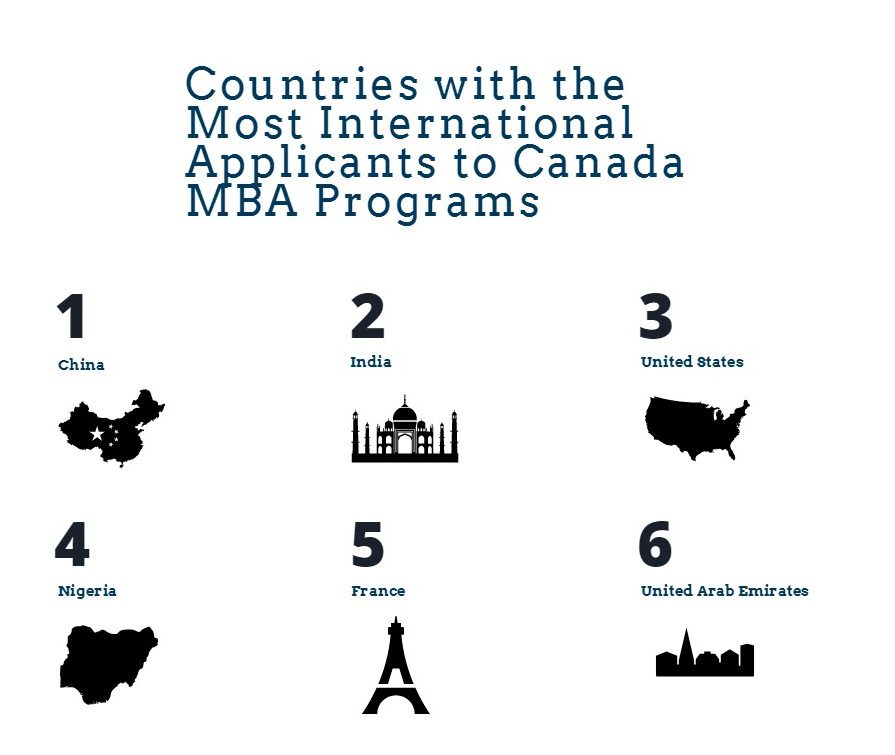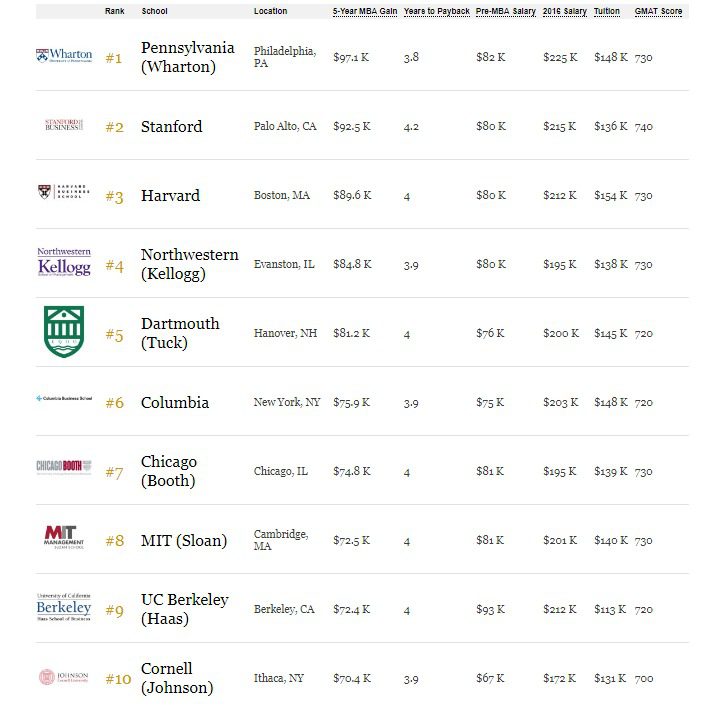Schulich Tops Forbes’ Canada Rankings

Canada: birthplace of poutine and your potential business school destination. If you’re looking at the latter, the Schulich School of Business at York University should be at the top of your list. It’s at the top of Forbes’.
The publication has ranked the business school as the best in Canada among two-year MBA programs. For all non-U.S. schools, Schulich came in fourth overall when looking at how long graduates take to make up the cost of their MBA.
Forbes‘ annual ranking analyzes what business schools are the best—and which ones are worth attending. They base their lists on a school’s return on investment, or, ROI. With this qualifier in mind, Schulich won among one-year and two-year MBA programs in Canada.
“Forbes has once again rated the Return on Investment provided by a Schulich MBA degree as one of the best in the world,” said Schulich Dean Dezsö J. Horváth, in a press release. “For MBA students, the Return on Investment they receive after graduating is a significant factor when determining the value of their degree. The latest Forbes survey captures an important statistical measure of the return on investment our MBA students can expect once they graduate.”
The school is not far from the bustle of downtown Toronto, providing an international appeal to its students, most of whom come from beyond Canada. In 2016, half of the MBA students came from Asian countries. Schulich offers a number of MBA programs, which a person can take full-time or part-time. But there’s an executive MBA and accelerated MBA too (it takes just eight months!).
Around 26 percent of applicants are accepted, so if Schulich is top of your list, you better be ready. It probably won’t be easy.
Paul Merage School of Business Full-Time MBA Earns Spot On Forbes’ Best Of List

The Paul Merage School of Business at the University of California, Irvine received some heavy honors from the recently-revealed Forbes list of the “Best Business Schools” in the U.S., which analyzes how much graduates typically earn five years after graduation. This year, the business school ended up 41st on the list overall, with a $47,000 USD five-year expected gain for full-time MBA grads.
Continue reading…
Canada’s MBA Programs are Rising

The recent release of the GMAC 2017 Prospective Students Survey Report revealed some mixed revelations. While the status of smaller U.S. school MBA programs may be up in the air, international programs, particularly in Canada, are looking rosier than ever.
Overall, schools in Canada and Europe saw a 50 percent-plus increase in application volume from international candidates, of which GMAC speculates may be a result of political turmoil, particularly in the United States. This is a direct contrast from four years prior, in which less-than half of the Canada, UK, and other European business schools were seeing international applicant growth.
In the GMAC survey, an anonymous Canadian full-time MBA also noted, “The US presidential election has had a impact on our application numbers. Many international students choose Canada as their first choice.”
Niki da Silva, the Managing Director of the full-time MBA program at the Rotman School of Management at the University of Toronto, recently spoke with the Globe & Mail after the release of the report, saying, “This is our opportunity. We have to be anti-Canadian in this moment and really talk about what we are doing. We don’t tend to do that but we need to.”
By The Numbers
Results from the survey found subtle yet distinct differences between the international applicant pools in the major MBA location destinations.

In the United States, Europe, and Canada, according to GMAC, the two most prolific countries with international applicants were unilaterally India and China, which came in either first or second place for each region. However, for Canada, the remaining top 10 international countries with high applicant pools differed slightly from the U.S. and Europe, especially regarding Middle Eastern and North African countries. The United Arab Emirates (6th most), Tunisia (9th), and Iran (10th) were no where to be found in either the U.S. or European top ten.
Breaking the applicant pools down further, GMAC found an unsurprising correlation between the distribution of citizenship by application for Canada and the U.S. and the new data trends. After Europe, which had the most diverse applicant pool (a tricky stat since Europe is qualifying every country on the continent, while the U.S. and Canada are counted as singular entities), Canada had the world’s second biggest international pool of applicants, with less than 50 percent of Canadian business school students having official Canadian citizenship.
Domestic applications, in contrast, are actually down. But the international pool in Canada is swelling, creating substantial overall growth.
“International applicants comprised the vast majority of applications to business programs in Canada—64 percent of MBA applications and 88 percent of business master’s applications.” – GMAC
Gregg Schoenfeld, GMAC’s Director of Research, also noted upward trend for Canadian schools, saying, “This is the first time in the past five years that the majority, in fact three-quarters [of Canadian schools in the survey], are saying they are growing international volumes.”
“From a speculative point of view, it seems that the U.S. political climate has essentially driven candidates to Canada,” he continued.
YOU MIGHT ALSO LIKE: The Highest Starting Salaries for Toronto MBA Grads
The move to enroll more international applicants in Canadian schools started to emerge several years ago. Following lower periods of domestic enrollment, Canada’s MBA programs made a concerted effort to bring in more talent from abroad, creating a multi-year spring in growth that has not only benefited school enrollment, but fostered a positive international environment.
According to Global Affairs Canada, the result has been a positive economic boon as well. Upwards of 90,000 new jobs were created for Canadians just two years prior, while adding $10 billion to the country’s economy.
Tim Daus, Executive Director of the Canadian Federation of Business School Deans, previously noted that the trend was partly made possible because of the country’s flexible immigration policies, saying, “Canada’s visa requirements are much more flexible than other countries’, which gives us an edge. That makes a big difference for students who want to stay and work afterwards.”
Canadian Accolades
The substantial growth Canadian business schools have seen may not solely be the result of political overtones, rather, that many of the country’s best institutions only continue to improve.
The Schulich School of Business at York University in Toronto earned some hefty recognition from Forbes‘ recently released “Best Business Schools” global rankings, earning the 8th spot among the best international two-year program in the world. Schulich grads, Forbes claims, can expect a five-year net gain of over $48,000.
Last year’s Bloomberg BusinessWeek ranking of the best non-U.S. business schools also recognized both the Ivey Business School at Western Canada University and the Rotman School of Management among the top 25 programs in the world. Both the aforementioned Ivey and Rotman programs were recognized among the world’s 100 best by the Financial Times this year as well.
Highest Paid Starting Salaries for Toronto MBA Grads

Earning an MBA in Toronto can be a practical decision for a myriad of reasons. Forbes named Canada the best country for business in the G20, with Toronto as its formal financial and business capital. It stands to reason Toronto may be one of the strongest areas for business not just in North American, but around the world as well. Its advantageous position close to the U.S. border makes the city a hotbed of international commerce, and as the fourth largest city on the continent, Toronto provides a wealth of opportunities for motivated professionals.
As though these reasons weren’t incentive enough to pursue higher education in Toronto, the city has the second highest quality of life in North America, according to the Mercer Quality of Living Survey. The city’s vital university system is full of talented and aspiring industry leaders ready to launch their own careers, readily taking advantage of everything the city has to offer.
For those of you planning to pursue your MBA in this cultural and fiscal epicenter, we’ve laid out which school grads have the highest starting salaries in the city.
The Highest Paid Toronto MBA Salaries
Ivey Business School—Western Canada University
Graduates from Ivey Business School will not be disappointed with the opportunities made possible by their degree. In 2016, 90 percent of graduating MBA students looking for jobs had received an offer by September and, by December, an impressive 96 percent of students were fielding offers. The average starting salary for grads in 2016 was $104,007 ($84,098 USD). The base salaries ranged from $40,000 to $192,000 ($32,344 to $155,255 USD), with the higher end of this range going to students who pursued consulting jobs. Since this program is just one year long, the high average starting salaries for students indicate a considerable return on investment, in terms of both money and time. Bloomberg BusinessWeek also ranked Ivey’s MBA as the best MBA program in Canada for the past three years.
YOU MIGHT ALSO LIKE: Toronto’s Best Nonprofit MBA Options
Rotman School of Management—University of Toronto
Those looking for an MBA education that will provide ample chance to earn a generous starting salary may be impressed with the possibilities open to Rotman School of Management grads. The average base salary for graduates in 2016 was $92,524 ($74,819 USD). The 2016 class had an employment rate of 80 percent within three months of graduation and an 85 percent employment rate after six months. The range of starting salaries for the class of 2016 went as high as $214,737 ($173,486 USD) in the legal services industry. Moreover, the Financial Times has named Rotman the best business school in Canada every year for over a decade.
Schulich School of Business—York University
An average starting salary of $91,860 ($74,282 USD) for the class of 2016 makes a Schulich School of Business an ideal place for motivated students to jump-start their careers. With 89 percent of MBAs from the class of 2016 hired within three months of graduation, Schulich grads clearly have a competitive edge in the business community. Schulich’s program is also renowned for its flexibility. Students can switch seamlessly between part-time and full-time enrollment, and can choose to accelerate their program for the opportunity to earn their degree in just eight months.
Wharton, Stanford Top Forbes’ 2017 Business School Ranking

For the first time ever, the Wharton School at the University of Pennsylvania topped the biennial Forbes list of the best business school’s in the United States.
Coming in second place on the Forbes 2017 rankings, revealed earlier today, was the Stanford Graduate School of Business, which was followed by Harvard Business School, Northwestern’s Kellogg School of Management, and Dartmouth’s Tuck School of Business rounding out the top five.

Forbes‘ top 10 U.S. business schools (2017)
Rounding out the top 20 were some familiar MetroMBA favorites, such as Columbia Business School (6th), Chicago Booth (7th), MIT Sloan (8th), UC Berkeley Haas (9th), UCLA Anderson (15th), the McCombs School of Business UT-Austin (17th), and the Mays Business School at Texas A&M (20th).
Just making the final cut on Forbes’ newest list, which includes only 70 schools, was the Fox School of Business at Temple University (60th), Pepperdine’s Graziadio School of Business and Management (65th), Northeastern’s D’Amore-McKim School of Business (66th), the Kogod School of Business at American University (67th), and the Gabelli School of Business at Fordham University.
Method To The Madness
Nearly every major publication that reveals its own respective business school ranking list has its own principle methodology in which it follows. For instance, unlike Forbes, the Financial Times ranking system relies more on alumni survey responses for its final ranking. While Forbes does utilize surveys in its ranking, its primary focus is on how graduates fare on their return on investment.
In the ranking release, Forbes staff writer Kurt Badenhausen notes:
“Our ranking of business schools is based on the return on investment achieved by the class of 2012. We examined more than 100 schools and reached out to 17,500 alumni around the globe. We compared graduates’ earnings in their first five years out of business school to their opportunity cost (two years of forgone compensation, tuition and required fees) to arrive at a five-year MBA gain, which is the basis for the final rank. Schools whose alumni had response rates below 15 percent or a negative return on investment after five years were eliminated.”
In regards to Wharton topping the 2017 list, Badenhausen writes, “These days most Wharton MBA students head to finance or consulting jobs upon graduation (79 percent of the class of 2012), which traditionally are the most lucrative areas for MBAs. The concentration in these sectors pushed Wharton’s current total compensation for the class of 2012 to the highest of any school in the world at $225,000.”
YOU MIGHT ALSO LIKE: The Highest MBA Salaries in Philadelphia
The exceptional cost of living around Stanford and shockingly low admissions rates (6 percent) contributed to the business school falling off its top spot from the prior year. Stanford GSB graduates, however, were given enormously valuable stock options after earning employment, with a median value of $380,000. Despite the astronomical figures, Stanford GSB grads still saw a dip of around $40,000 in total five-year compensation compared to the Class of 2010. Similarly, HBS grads saw a $28,000 five-year drop compared to the Class of 2010. Wharton 2012 grads, in contrast, gained $18,000 compared to two years prior.
In regards to employment, not much has changed since 2012. McKinsey and Co. was the top employer of the Wharton Class of 2012, hiring over 50 of the school’s 800-plus graduates. Alongside McKinsey were Bain, BCG, and Deloitte, which are still the school’s top employers. However, since then, Amazon has overtaken Goldman Sachs in the Wharton recruitment war.
Thomas Jueng, Seoul native and 2012 Wharton grad, tells Forbes, “Wharton was a great springboard to make a transition geographically and job position-wise with a strong brand name and network as well as providing practical knowledge.”
Read the entire Forbes list of the best U.S. business schools here.
Top MBA Recruiters: Unilever

A job is possible for any determined MBA graduate. Obviously, the ideal job differs from graduate to graduate, but if you’re into sustainable choices for consumers, Unilever might be right for you. The company specializes in household products like soap, shampoo, and even iced tea. Well-known brands like Lipton and Dove are also underneath the Unilever umbrella.
The corporation consistently makes it on Forbes‘ top companies lists. Currently, Unilever is 103rd on the Global 2000 and 87th for America’s Best Employers. In 2013, it also came in 63rd among Innovative Companies. While students who study health and medicine rank the company highest, business and commerce students ranked it 12th in terms of attractiveness, according to Universum data. Broadly, LinkedIn ranked Unilever 8th in the world in a list of attractive employers.
The company employees 169,000 people with 46 percent of its managers women. With an MBA, maybe you could be next.
Why Unilever?
Unilever’s been around since 1930. It made bar soap a thing. It also helped popularize margarine, fish fingers, and frozen vegetables. The company truly revolutionized the modern age. Who wouldn’t want to be part of a legacy?
Unilever is also global: Its Indian branch, Hindustan Unilever, was ranked one of the world’s most innovative companies this year by Forbes for how it broke up the country into clusters to cater to different regions appropriately. The company has branches in Africa, throughout the Americas, Europe, the Middle East, and Asia Pacific. So a job at Unilever can take you anywhere in the world.
The corporation isn’t like most. It has a clear mission, one dedicated to health and well-being. It’s launched campaigns around the world to help bring facts around nutrition to developing countries. Unilever is currently working on halving the environmental impact of its products.
According to Glassdoor, Unilever offers some competitive salaries. Associate brand and finance managers can expect to make $95,000 a year, on average. Once a person reaches the finance or brand manager (without the associate), the salary increases by about $20,000. Overall, the ratings are high on Glassdoor, where employees are known to be brutally honest.
The company also boasts the ability for graduates to continue learning while at Unilever. It’s a place that allows individuals to grow and build upon their career—the ideal environment for a recent grad.
Working at Unilever
It may not be much of a surprise, but a lot of people want to work at Unilever. LinkedIn compiled a list of North America’s top 100 in-demand employers in 2015, with Unilever coming in 25th: ranked higher than Fox, Warner Bros, and Whole Foods Market.
The company has a global MBA recruitment channel where it looks for MBA holders who have at least three years experience in finance, marketing, or supply chain. The channel connects applicants with available openings for which they’re qualified, like an associate finance manager position with Ben & Jerry’s, another one of Unilever’s brands. Or what about a production support engineer? Unilever offers a variety of positions relevant to MBA graduates.
This is perfect because MBA students have been clear that they’d like to work at Unilever. It sat 34th on a list of 100 employers where MBA students said they’d like. MBA candidates from NYU Stern, the Wharton School, and Rutgers Business School have gone on to work for Unilever.
